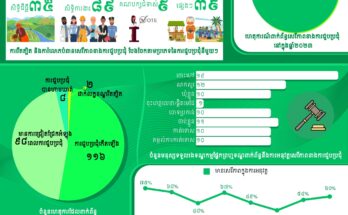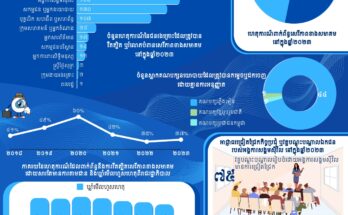Phnom Penh, 25 June 2013 – The Cambodian Human Rights and Development Association (ADHOC) is concerned with the light sentencing of Mr. Chhouk Bandith, the former Bavet City Governor who was today sentenced while absent from court for firing into a crowd of garment factory workers in February 2012. Mr. Bandith was found guilty of causing unintentional violence and sentenced to 18 months in jail and ordered to pay 38 million riel to three people injured in the shooting. The charges against Mr. Bandith do not fairly represent the severity of his actions. He injured three people by wildly shooting at demonstrators, an act of violence that seems anything but unintentional.
The case against Mr. Bandith is has been simple from the start. Credible eyewitness accounts put him at the scene firing at people.
The judiciary’s treatment of this case has been farcical. Mr. Bandith was not detained when under investigation by the Svay Rieng Provincial Court, and his whereabouts are unknown. This is in stark contrast to the treatment of innocent human rights defenders such as Boueng Kak Lake activist Yorm Bopha, who languishes in jail convicted of a crime that there is very little evidence to suggest she actually committed.
The Svay Rieng Provincial Court ordered charges against Sar Chantha, the Bavet Cty police chief implicated in the shooting, to be dropped. He was however found guilty of the illegal use of a weapon, fined one million riel and put on probation for six months. There is little credible evidence linking Mr. Chantha to the crime of shooting the garment workers and he appears little more than a scapegoat, punished now in order to save face for those who sought to implicate him.
Mr. Bandith and his supporters have been able to exert a considerable amount of pressure on the courts. The nature of his conviction and the fact that he is still not in jail demonstrate the pliability of Cambodia’s judiciary to the will of the rich and well-connected.
The Case against Chhouk Bandith:
On 20 February 2012, three female garment workers – Keo Ny, 19; Boun Chenda, 21; and Nuth Sokhorn, 23 – were shot and injured at a protest outside the Kaoway Sports Limited factory in Svay Rieng SEZ. The factory makes shoes for Puma, the German sportswear giant. Workers were striking for better conditions when Chhouk Bandith, then Bavet City Governor, stepped out of his car and fired into the protesting crowd.
Mr. Bandith was removed from his post after he reportedly confessed to the shooting at the Provincial Court on 15 March 2012. However, he walked free from the court on that day and has never been detained. He was later charged with causing “unintentional violence”, which was widely derided given the nature of the alleged crime, which could have attracted the qualification of “attempted murder”.
On 19 December 2012, the Provincial Court decided to drop all charges against Mr. Bandith, despite the seriousness of the crime, his previous confession, and numerous witnesses to the original incident. Instead, the court charged Sar Chantha, a lower-ranking police officer, with the triple shooting. It was later revealed that the Ministry of Justice had instigated a report by the Ministry of Interior on the alleged involvement of Sar Chantha in the shooting. According to witnesses, however, when the shooting happened Mr. Chantha was hundreds of meters away.
In a welcome development, Mr. Bandith was called to appear before the Court of Appeal in Phnom Penh at the request of Ouk Savuth, the Prosecutor General, to decide whether criminal charges should be brought against him.
The hearing, which began on 27 February 2013, lasted three days and was closed to the public. In the afternoon of 4 March 2013, where neither the Mr. Bandith nor his lawyer was present at the ruling, the Court of Appeal ordered the Svay Rieng Provincial Court to reinvestigate the case against Mr. Bandith.
The trial
Mr. Bandith was not present during the trial in Svay Rieng either, which concluded on 21 June 2013, and was absent again today for his sentencing. Though it is a step forward that Mr. Bandith has been sentenced and that an arrest warrant has been put out, he still avoids jail. Justice therefore remains elusive for the three victims of this crime and the judicial authorities must learn lessons in order to avoid such errors in the future.
Conclusion:
The rich and powerful cannot act with impunity when accused of grave crimes. The catalogue of errors which have plagued the case against Chhouk Bandith has highlighted the lack of judicial independence in Cambodia. The sentence against him does not reflect his crimes, and the fact that he remains at large means justice has still not been served in this case. ADHOC cannot welcome the sentence if in practice it means so little. The judicial authorities must work for the people, whether wealthy or poor, and assert its independence so Cambodians can have faith in the country’s democratic institutions.
For more information, please contact:
Mr. Ny Chakrya, Head of Human Rights and Legal Aid Section: 011 274 959
Mr. Nay Vanda, Deputy Head of Human Rights and Legal Aid Section: 012599106
Mr. Neil Loughlin, Technical Assistant: 092 648 318; loughlin.adhoc@gmail.com



